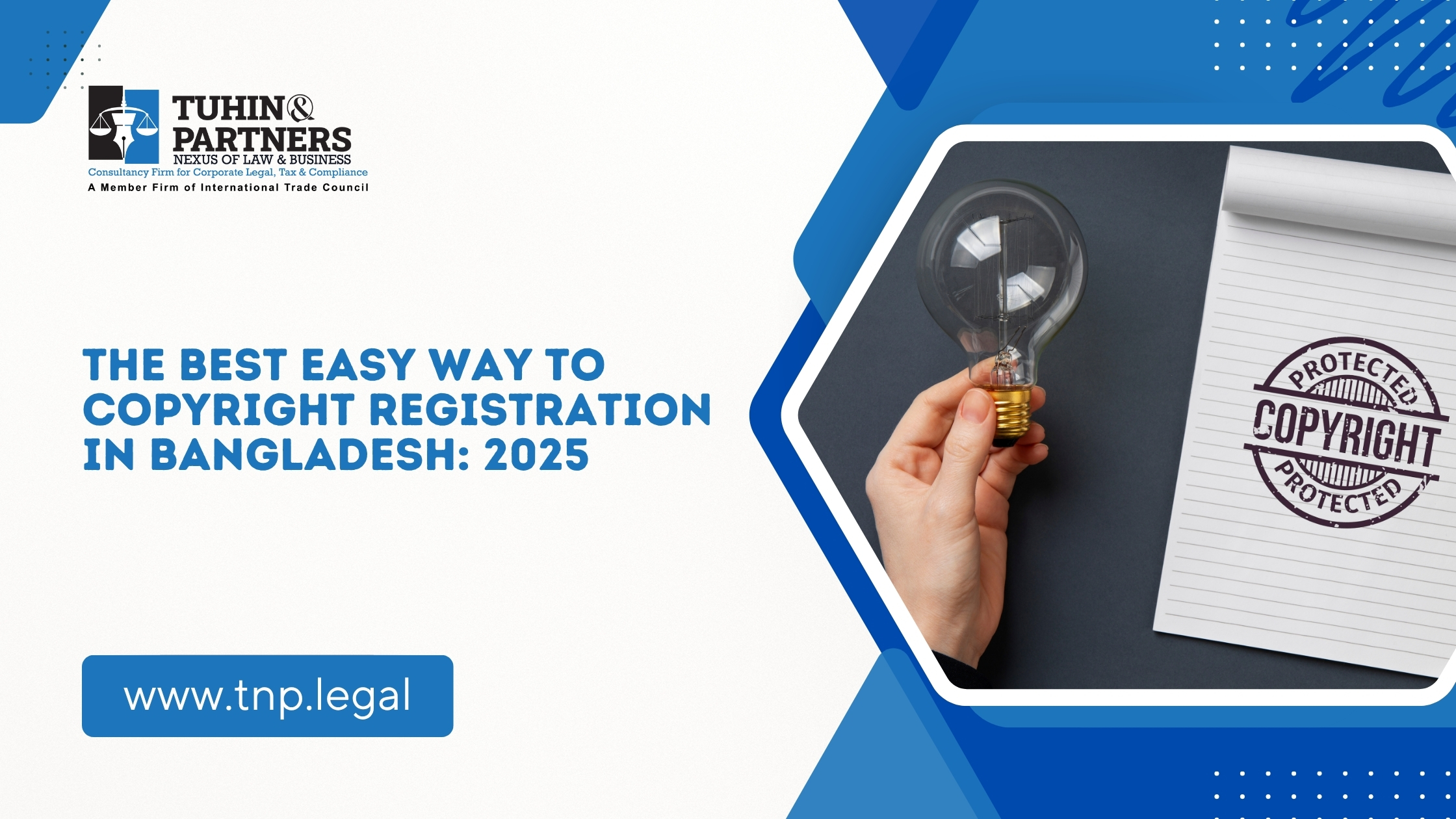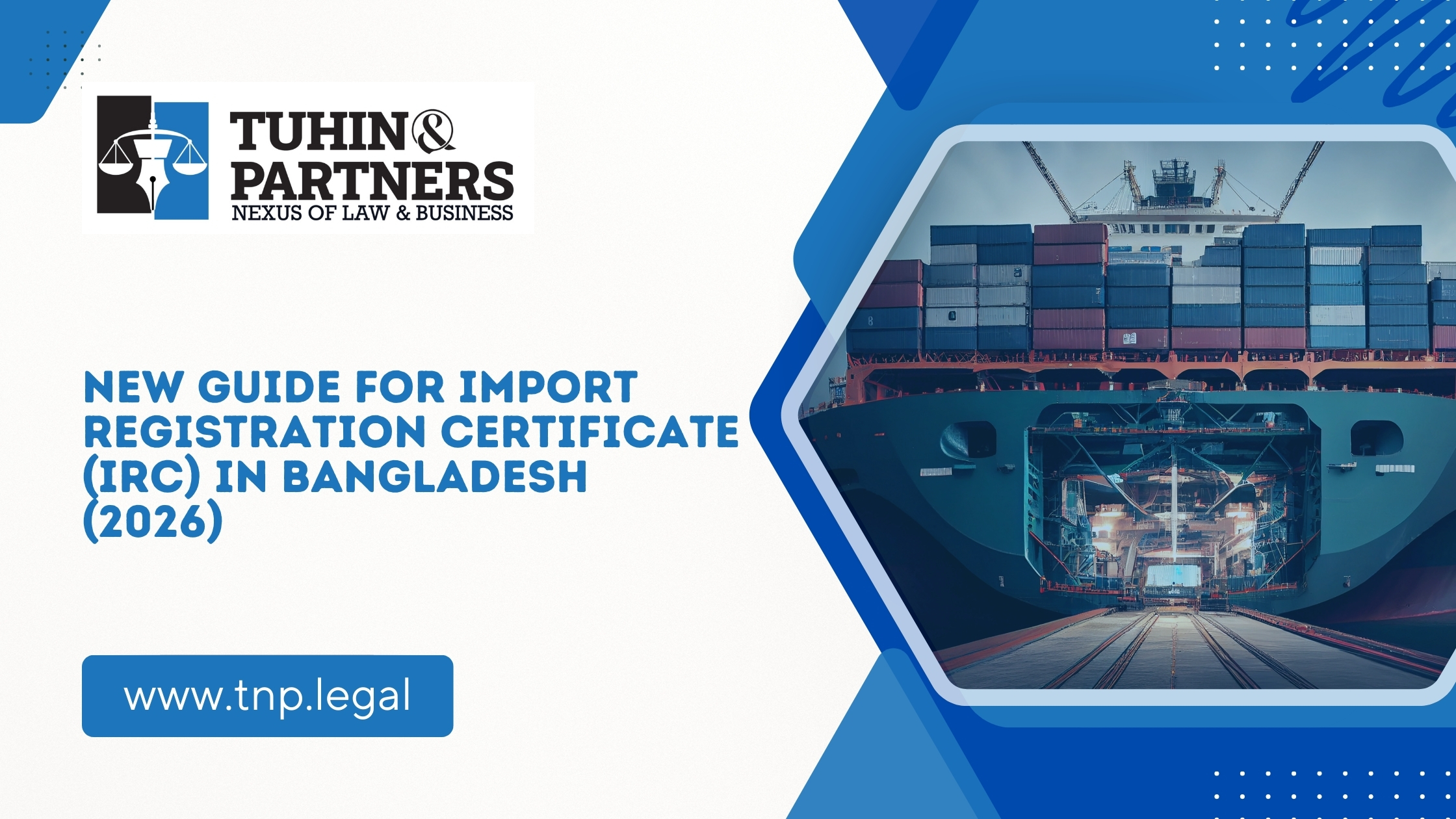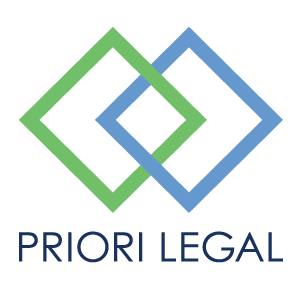Copyright Registration in Bangladesh is vital for protecting intellectual property. The Copyright Act, 2023, governs this process and safeguards original works. Copyright protection is automatic upon creation, but officially registering with the Bangladesh Copyright Office provides key legal benefits in disputes.
Copyright Registration in Bangladesh
-
What is Copyright?
-
Governing Laws:
-
Colonial and Post-Partition Era:
-
Post-Independence and Modernization:
-
The Digital Age and Beyond:
-
International Treaties:
- Berne Convention for the Protection of Literary and Artistic Works: Bangladesh joined this convention on May 4, 1999. The Berne Convention is a key international agreement establishing the principle of “National Treatment,” meaning works from one member country receive equivalent copyright protection in all member countries.
- Bangladesh is a WTO member, so it follows the TRIPS agreement. This agreement sets basic rules for intellectual property. Copyright protection is automatic when a work is created, so it is not necessary to register a work for basic safety in a TRIPS member country. However, TRIPS asks members to have sound systems to enforce rights. In Bangladesh, registering your copyright gives you official proof of ownership. This proof helps in legal cases and makes it easier to claim damages if someone copies your work. In short, TRIPS protects creators from the start, and registering your copyright helps you defend your rights.
- WIPO Convention: Bangladesh became a member of the World Intellectual Property Organization (WIPO) on May 11, 1995. WIPO is a specialized United Nations agency dedicated to promoting intellectual property protection worldwide.
Authority of Copyright Registration in Bangladesh
- Name: Copyright Office, Bangladesh.
- Address: National Library Bhaban (Level 3), 32, Justice S.M. Murshed Sarani, Agargaon, Sher-e-Bangla Nagar, Dhaka-1207, Bangladesh.
- Website: www.copyrightoffice.gov.bd
Scope of Protection Terms Copyright Registration in Bangladesh
- Literary works: Books, articles, poetry, speeches, computer programs
- Artistic works: paintings, drawings, sculptures, maps, photographs.
- Musical works: songs, compositions, lyrics.
- Dramatic works: plays, scripts, choreography.
- Cinematographic works: Movies, documentaries, video productions.
- Sound recordings: recordings of music, spoken word.
- Software and digital works: Software, databases, and various IT-oriented digital works.
What Copyright Registration in Bangladesh Does Not Protect?
Benefits of Copyright Registration in Bangladesh
- Legal evidence of ownership
- Public record
- Facilities endorsement
- Commercial value
- Prevent Misuse
- International Recognition
- Ability to file a lawsuit
- Eligibility for statutory damages and attorney’s fees
- Prevention against infringement
- Establishes a date of creation
Who is Eligible to Apply for Copyright Registration in Bangladesh?
Copyright Registration in Bangladesh Procedure:
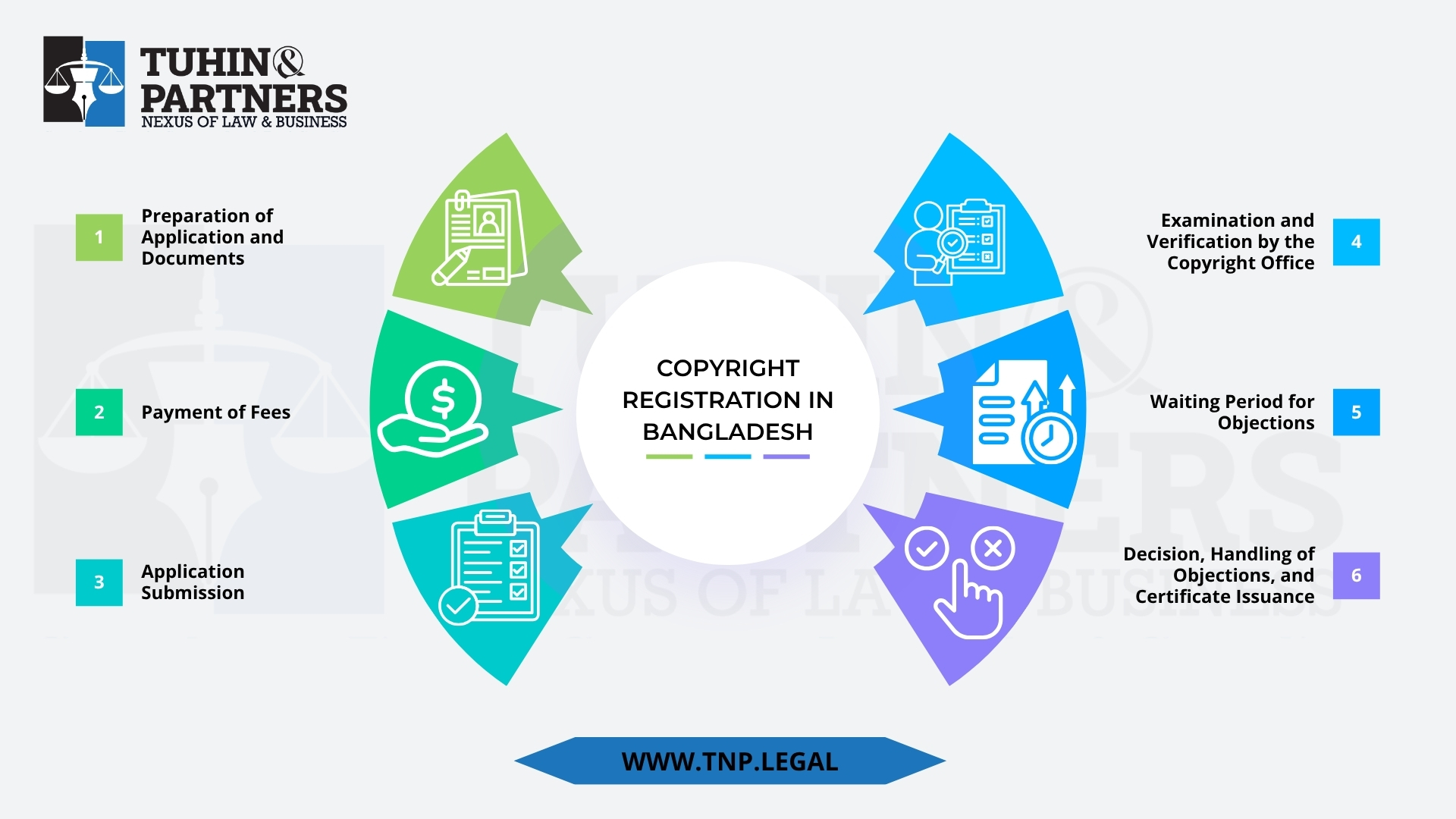
Step 1: Preparation of Application and Documents for Copyright Registration in Bangladesh
The first and most crucial stage of copyright registration in Bangladesh is preparing a complete and accurate set of documents and information before submission. Proper preparation helps avoid administrative delays and ensures smooth verification by the Bangladesh Copyright Office.
To begin the process:
-
Gather all required information related to the applicant and the creative work, following the checklist provided in the Required Documents for Copyright Registration in Bangladesh section.
-
Ensure that the official application form is correctly filled out with accurate details of the work, applicant, and ownership.
-
For physical submission, all necessary attestations should be adequately completed — including the attester’s name, designation, and official seal, which must be clear and legible.
-
Double-check that all supporting papers, such as the undertaking, identity proof, deed of assignment, or power of attorney, are signed and prepared on the correct type of paper (e.g., non-judicial stamp or cartridge paper) as required under the Copyright Act, 2023 and other relevant laws.
Proper preparation at this stage makes sure that your copyright registration application in Bangladesh is complete, compliant, and ready for payment and submission in the next step.
Pro Tip: Incomplete or improperly attested documents are among the most common reasons for delay or rejection in the copyright registration process in Bangladesh. Reviewing each form carefully before submission saves significant time.
Documents Required for Copyright Registration in Bangladesh
When applying for copyright registration in Bangladesh, applicants must prepare a set of documents as prescribed by the Copyright Act, 2023 and the Copyright Rules. These documents ensure that the ownership, originality, and nature of the work are verified adequately before registration. Below is a step-by-step breakdown of the essential documents required:
1. Application Form
A completed copyright application form in the prescribed format must be submitted, either online or physically, to the Bangladesh Copyright Office.
2. Copies of the Work
Two copies of the creative work are required for submission:
-
Software: A CD or flash drive containing the source code or demo version.
-
Artistic works: High-quality copies or photographs of the artwork.
-
Music: A list of songs (maximum 12 per application) with names of the lyricist, composer, and singer, signed by the applicant.
3. Statement of Particulars
A detailed Statement of Particulars (as per Form I of the Copyright Rules) must be provided. This is often prepared on non-judicial stamp paper, containing key details of the applicant and the work.
4. Proof of Identity and Address
Depending on the applicant type:
-
For Individuals: Photocopy of National ID card or passport, plus one attested passport-sized photograph.
-
For Companies/Institutions: Copies of the company’s Memorandum and Articles of Association, updated Trade Licence, TIN certificate, and the latest income tax return acknowledgement.
5. Undertaking or Affidavit
An undertaking or affidavit (on cartridge or non-judicial stamp paper) confirming:
-
The originality of the work.
-
That no legal disputes are pending regarding ownership.
-
The accuracy of the submitted information.
6. Deed of Assignment (if applicable)
If the applicant is not the original creator, a notarised Deed of Assignment or transfer agreement executed on appropriate non-judicial stamp paper must be submitted. This document should clearly establish the legal transfer of copyright ownership.
-
If the work was created under employment, the creator’s appointment letter or employment agreement may also be required.
-
For joint works or designs (e.g., cover art), a Deed of Transfer from the respective contributor must be attached.
-
If the copyright is transferred from a foreign entity to a Bangladeshi applicant, the Deed of Transfer from the foreign owner is necessary.
7. Power of Attorney (Vakalatnama)
If an advocate or authorised agent is submitting the application, a Power of Attorney duly signed by the applicant must accompany the form.
8. Applicant’s Contact Information
The applicant’s full name, address, and contact number must be clearly mentioned in the form to facilitate official correspondence.
9. Work-Specific Details
Depending on the nature of the work, additional information may be required:
-
Software: Description of its usability, features, or functionality.
-
Artistic Works: An artistic explanation or visual description of the piece.
Step 2: Payment of Fees for Copyright Registration in Bangladesh
Before submission, applicants must confirm the applicable copyright registration fee directly from the Bangladesh Copyright Office. The fee amount may vary depending on the category of the creative work and any updated government circulars.
Once confirmed:
-
Pay the prescribed fee via a Treasury Challan at a designated bank such as Bangladesh Bank or Sonali Bank, under the specific government head of account.
-
Alternatively, payment can be made through an online payment portal linked from the official Copyright Office website.
-
Keep the original Treasury Challan or digital payment receipt as proof of payment, as it must be attached to the application.
Proper payment verification makes sure that your copyright registration in Bangladesh goes smoothly without administrative delays.
Step 3: Application Submission for Copyright Registration in Bangladesh
The application can be submitted both online and physically, depending on the applicant’s preference and the type of work being registered.
Online Submission
Applicants can submit their copyright application through the e-Copyright system of the Bangladesh Copyright Office, available at www.bcoecopyright.gov.bd.
-
Create an account on the portal.
-
Fill in all necessary details and upload the required documents electronically.
-
Submit the application to receive a system-generated reference number.
Physical Submission
After online submission, a printed copy of the application (including the reference number), along with all required hardcopy documents and the original Treasury Challan, must be physically submitted within the prescribed time frame — typically within 15 days of the online submission.
Submission Address:
Copyright Office, Bangladesh National Library Bhaban (3rd Floor)
32, Justice S.M. Murshed Sarani, Agargaon, Sher-e-Bangla Nagar, Dhaka-1207, Bangladesh
Step 4: Examination and Verification by the Copyright Office
Once the application and documents are received, the Bangladesh Copyright Office begins a structured examination process to verify the accuracy and authenticity of the submission.
Typical process and time frame:
-
Application Receipt & File Creation: Acknowledgement and creation of a case file (≈ 3 working days).
-
Document Scrutiny: Inspectors verify the accuracy and completeness of submitted materials (≈ 3 working days).
-
Challan Verification: Confirmation of payment validity and accuracy (≈ 7 working days).
-
Final Document Check: Assistant Examiner reviews all documents for compliance (≈ 5 working days).
-
Case Examination: Examiner assesses whether the application meets the requirements of the Copyright Act, 2023(≈ 5 working days).
-
Deputy Registrar’s Opinion: Review of the examiner’s findings and recommendation for final decision (≈ 3 working days).
If discrepancies, missing documents, or clarifications are required, the applicant is notified and allowed to submit corrections or additional materials before further processing.
Step 5: Waiting Period for Objections
Following verification, there is a mandatory 30-day waiting period during which the copyright application remains open to the public for potential objections.
-
The waiting period starts from the date of application acceptance.
-
Any third party claiming ownership or opposing registration may file an objection within these 30 days.
-
After the objection period ends, the application is typically reviewed by the Copyright Registrar around the 31st day.
This period ensures transparency and protects existing copyright holders from potential duplication or infringement.
Step 6: Decision, Handling of Objections, and Certificate Issuance
After the objection period, the Registrar proceeds to make a final decision on the copyright registration in Bangladesh based on the application’s compliance and any objections received.
If No Objections Are Received:
-
The Registrar verifies all final details and approves registration.
-
The copyright details are entered into the Register of Copyrights, and a Certificate of Registration is issued to the applicant (usually within 3 working days after approval).
If Objections Are Raised:
-
The applicant is notified within 3 days of objection identification.
-
An investigation is carried out (approximately between the 31st and 44th day after application).
-
A hearing is scheduled around the 45th day, allowing both parties to present their positions.
-
The Registrar issues a decision based on the investigation and hearing outcome.
Once approved, the registration details are entered into the official Column Register (≈ 10 working days), and the original file is archived at the Copyright Office Library (≈ 7 working days).
In summary, obtaining copyright registration in Bangladesh involves a structured process that ensures authenticity, transparency, and proper ownership validation. Once completed, the Certificate of Copyright Registration serves as definitive proof of ownership, offering strong legal protection for your creative work.
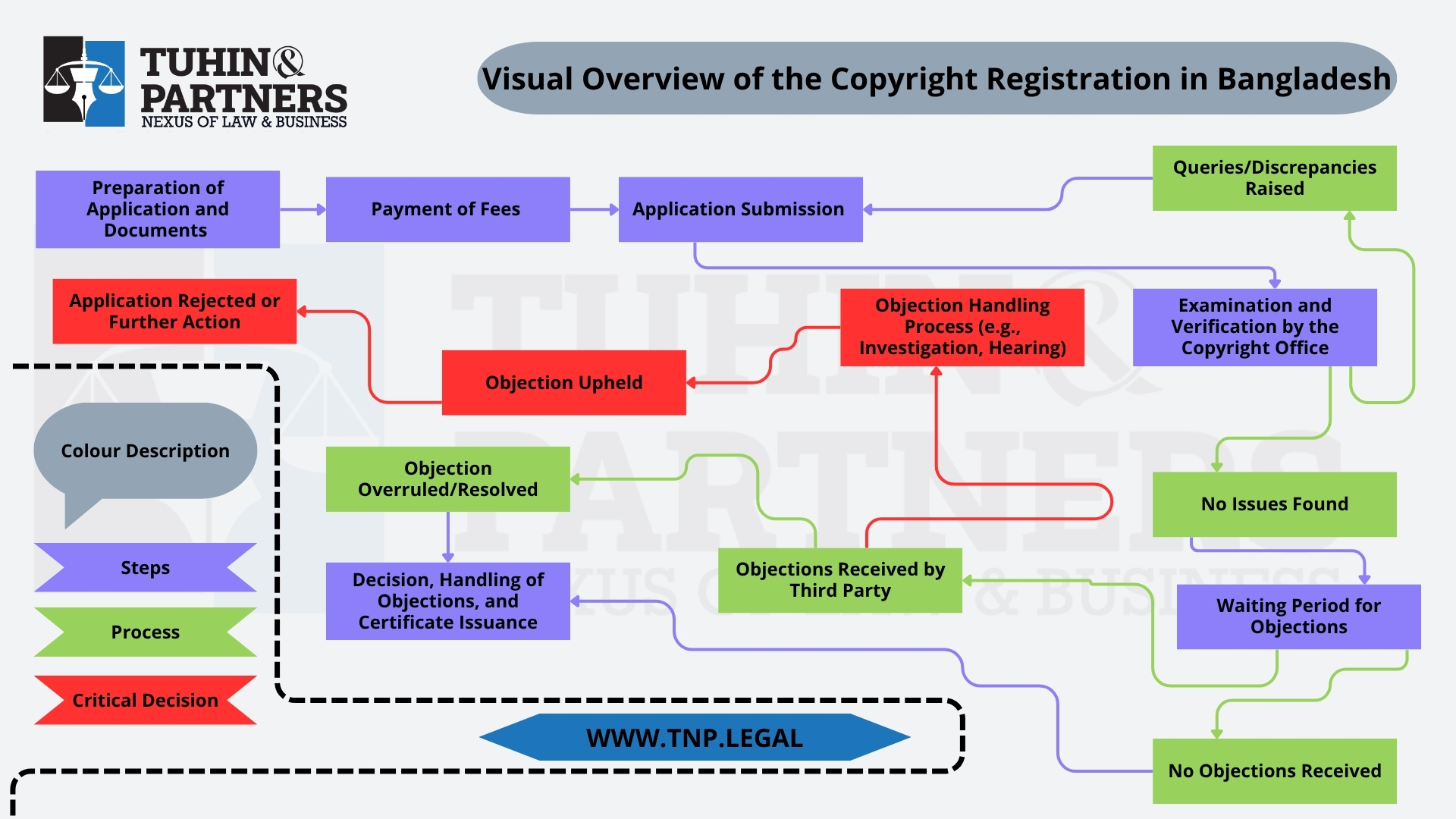
Fees for Copyright Registration in Bangladesh
The Bangladesh Copyright Office determines the fee structure for copyright registration in Bangladesh and may vary depending on the type of creative work and supporting documents involved. Applicants are advised to verify the latest fees before submission, as these are subject to periodic updates under official notifications.
1. Registration Fee for Copyright Registration in Bangladesh
The primary application processing fee for copyright registration is generally around BDT 1,000 for most creative works, as per recent citizen charters. However, this amount may change based on the category of the work or administrative updates.
-
Payments are made via Treasury Challan to the designated government revenue code through Bangladesh Bank or Sonali Bank.
-
Alternatively, applicants can pay online through the Copyright Office’s official payment portal, where available.
-
The original e-Challan or online payment receipt must be attached to the application as proof of payment.
2. Stamp Paper and Related Costs for Copyright Registration in Bangladesh
Additional costs may arise for non-judicial stamp paper, which is required for certain documents accompanying the application, such as:
-
Statement of Particulars (if executed on stamp paper)
-
Undertakings or Affidavits affirming originality and ownership
These stamp paper expenses vary depending on the value and type of document being executed, but are a standard part of the copyright registration process in Bangladesh.
Note: Keeping updated with the current copyright registration fee schedule helps applicants avoid processing delays or document rejections. It’s recommended to consult the Bangladesh Copyright Office or a qualified legal advisor before submission.
Timelines for Copyright Registration in Bangladesh
Understanding the processing time for copyright registration in Bangladesh is essential for creators, businesses, and legal representatives planning to secure ownership rights over their creative works.
Official Timeline (as per Copyright Office Guidelines)
According to the Citizen Charter of the Copyright Office, the standard processing period for copyright registration of creative works in Bangladesh is approximately 60 working days from the date of submission of the hard copy application — provided that all documents are accurate, complete, and no objections are raised during the examination process.
Practical Timeline (Actual Processing Duration)
In practice, the actual time for copyright registration may vary depending on several factors:
-
The complexity and type of creative work submitted.
-
The workload and case volume at the Bangladesh Copyright Office.
-
The accuracy and completeness of your documentation.
-
Any queries or objections raised during verification or examination.
As a result, applicants should anticipate a total duration of two to three months, or in some cases even longer, to complete the entire registration process and receive the Certificate of Copyright Registration in Bangladesh.
Duration of Copyright Protection:
Here is a Breakdown of the Time Duration:
- For most works (literary, dramatic, musical, and artistic): Copyright protection lasts for the lifetime of the author plus 60 years from the beginning of the calendar year following the year of the author’s death.
- For the works of joint authorship: The term is 60 years from the death of the last surviving author.
- For cinematographic films, sound recordings, and photographs: Copyright lasts for 60 years from the beginning of the calendar year following the work was first published.
- For government works and works of local authorities: The duration is 60 years from the date of first publication.
- For broadcasting rights: Protection lasts for 25 years from the beginning of the calendar year in which the broadcast was made.
- For performers’ rights: The term is 50 years from the beginning of the calendar year in which the performance was made.
- For the publisher’s rights related to the typographical arrangement of an edition: The term is 25 years from the beginning of the calendar year following the year the edition was first published.
Enforcement of Copyright/Remedies Under Copyright Protection
-
Civil Remedies:
-
Criminal Remedies:
-
Administrative Remedies:
The Role of Technology, e-Copyright for Copyright Registration in Bangladesh
Common Challenges in Copyright Registration in Bangladesh
- Bureaucratic delays
- Disputes over ownership
- Lack of a digital application system
- Awareness gap among creators
Recent Developments and Global Relevance
Conclusion
Copyright registration in Bangladesh plays a crucial role in protecting creativity, ensuring fair recognition, and supporting the country’s growing knowledge economy. While copyright protection arises automatically under the Copyright Act, 2023, formal registration with the Bangladesh Copyright Office provides creators and organizations with essential legal evidence to enforce their rights, prevent infringement, and secure commercial advantages. The new Act’s alignment with international treaties, its focus on digital protection, and its recognition of folklore and traditional knowledge reflect Bangladesh’s evolving commitment to intellectual property protection in the global context.
However, navigating the registration process — from preparing documents to handling objections and ensuring compliance — can be complex, especially for businesses, publishers, and digital creators unfamiliar with the legal framework.
Editor: Osman Gani Tuhin
Author: Anisa Tahsin
At Tuhin & Partners, we help individuals, companies, and creative professionals secure their intellectual property through seamless copyright registration in Bangladesh. Our team assists with preparing applications, ensuring compliance with the Copyright Act, 2023, managing communications with the Copyright Office, and representing clients in copyright disputes or enforcement actions. Whether you are an author, software developer, filmmaker, or brand owner, we ensure your creative work receives the legal protection it deserves — both in Bangladesh and internationally.
Protect your creativity. Strengthen your rights. Partner with Tuhin & Partners for copyright registration in Bangladesh.

